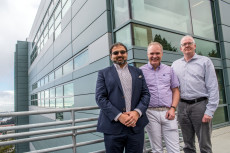Berkeley Lab to Push Quantum Information Frontiers With New Programs in Computing, Physics, Materials, and Chemistry
New funding from DOE’s Office of Science broadens Berkeley Lab’s quantum information science capabilities
September 24, 2018
Dan Krotz, dakrotz@lbl.gov, +1 510-486-4019

From left to right: Irfan Siddiqi, Bert de Jong and Jonathan Carter. (Photo by Marilyn Chung, Berkeley Lab(
A series of DOE Office of Science awards, announced today, will enable Berkeley Lab to accelerate the development of quantum computing, which holds the promise of solving science problems that are far beyond the reach of today’s computers. The awards also further Berkeley Lab’s ability to optimize fabrication techniques for qubits (the fundamental units of quantum computing and sensing), improve quantum coherence in next-generation materials, create quantum-based sensors for discoveries in physics, and develop quantum computing algorithms for chemistry research.
Berkeley Lab Computing Sciences staff will play leading roles in three of the awards including:
Advanced Quantum Testbed
Berkeley Lab will receive $30 million over five years from the Office of Advanced Scientific Computing Research to build and operate an Advanced Quantum Testbed (AQT) for exploring superconducting quantum processors and evaluating how these emerging quantum devices can be utilized to advance scientific research. As part of this effort, Berkeley Lab will collaborate with MIT Lincoln Laboratory to deploy varied quantum processor architectures.
The project’s goal is to establish a multi-partner scientific collaboration to build a platform that researchers can use to answer basic questions about quantum computing. The AQT will operate as an open resource for the community, allowing external researchers to evaluate superconducting architectures developed by testbed staff for simulations in chemistry, materials, and other areas of computation. The AQT will also address outstanding problems that impede the scalability of quantum computing devices. Industry can take the ideas developed at the testbed and transform them into commercial products.
The AQT is led by Irfan Siddiqi, a faculty scientist in Berkeley Lab’s Materials Sciences Division, and Jonathan Carter, deputy of science for Berkeley Lab’s Computing Sciences Area. Go here to read a more detailed news release on the AQT: https://crd.lbl.gov/news-and-publications/news/2018/berkeley-lab-to-build-an-advanced-quantum-computing-testbed
Quantum Computing Algorithms for Chemistry
Another project will combine the power of conventional computing and quantum hardware to tackle complex chemistry topics such as catalysis, photocatalysis, actinide chemistry, and related fields. Bert de Jong, a scientist in Berkeley Lab’s Computational Research Division, is a co-principal investigator on the project, which is led by Pacific Northwest National Laboratory and funded by the Office of Basic Energy Sciences.
The project will embed quantum hardware in a conventional computational chemistry framework. Through this effort, algorithms that will benefit from quantum hardware can be deployed on quantum coprocessors while the bulk of the program logic remains on conventional computer architecture. Quantum computers have a hardware advantage over conventional computers in simulating strongly interacting quantum systems, and have the potential to more accurately capture complex chemical transformations.
In addition, Quantum Algorithms for Chemical Sciences, which is led by de Jong, will continue to develop novel algorithms, compiling techniques, and scheduling tools that will enable near-term quantum computing platforms to be used for scientific discovery in the chemical sciences and beyond. This project is funded by the Office of Advanced Scientific Computing Research.
More about the Berkeley Lab awards: https://newscenter.lbl.gov/2018/09/24/berkeley-lab-to-push-quantum-information-frontiers-with-new-programs
About Berkeley Lab
Founded in 1931 on the belief that the biggest scientific challenges are best addressed by teams, Lawrence Berkeley National Laboratory and its scientists have been recognized with 16 Nobel Prizes. Today, Berkeley Lab researchers develop sustainable energy and environmental solutions, create useful new materials, advance the frontiers of computing, and probe the mysteries of life, matter, and the universe. Scientists from around the world rely on the Lab’s facilities for their own discovery science. Berkeley Lab is a multiprogram national laboratory, managed by the University of California for the U.S. Department of Energy’s Office of Science.
DOE’s Office of Science is the single largest supporter of basic research in the physical sciences in the United States, and is working to address some of the most pressing challenges of our time. For more information, please visit energy.gov/science.









